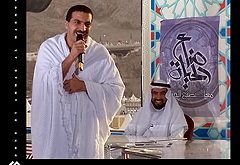Stephen Marmura tries to explain the persistence of mistaken beliefs about 9/11 and about the rationale for invading Iraq among the US and Egyptian publics, concluding that memories and long-term discourses sometimes outweigh short-term media effects.
Read More »Egypt
Cyber infidelity in Egypt’s virtual world
Ingrid Wassman reports on the effects the Internet, satellite television, and other cyber technologies are having on marriage, relationships, and gender interaction in Egypt’s traditionally conservative society
Read More »Cosmopolitan Islamism and its Critics
Maurice Chammah analyzes the thinking behind the Islam-oriented music television channel 4Shbab, noting contradictions in its vision of the interaction between Islam and the West. He looks at the audience which 4Shbab assumes already exists and the audience which it hopes to create, and discusses Western media reactions to the project.
Read More »Islamic Televangelism: Religion, Media and Visuality in Contemporary Egypt
Yasmin Moll writes on visual aspects of the phenomenon of Islamic televangelism, arguing that: “a consideration of contemporary media practices in Islam invites us to expand our definition of what the visual might be and what acts of seeing might entail.”
Read More »A new direction or more of the same?
Blogging has intensified political trends first triggered by the birth of satellite television and an independent print press but does not mark a new departure for Egyptian politics, argues Tom Isherwood.
Read More »Salafi satellite TV in Egypt
Is the Egyptian government using new Salafi stations to counter the more politically active Muslim Brotherhood? Nathan Field and Ahmed Hamam on the growing popularity of ultra-conservative religious programming.
Read More »Islamic music video channel 4Shbab launches
Funded by Saudi investors, the Islamic music video network 4Shbab is the latest project of Ahmed Abu Haiba, former producer for the Amr Khaled series Kalam min al-Qalb. Video segment prepared by Ismail Elmokadem along with three video clips currently on air.
Read More »Framing April 6: Discursive dominance in the Egyptian print media
The strikes in Egypt held on 6 April 2008 had mixed results – but you wouldn’t know that from reading the country’s main papers. Aaron Reese analyzes how the Egyptian press framed coverage for and against the protesters.
Read More »Egypt’s audiovisual translation scene
Muhammad Gamal argues for more academic and professional attention to the audiovisual translation industry, which is proliferating everywhere from mobile phone screens to stadium megatrons.
Read More »Lessons worth learning: The Indonesian model
Over the last two decades an explosion of new private outlets has dramatically changed Indonesia’s media landscape, writes Publisher and Co-Editor Lawrence Pintak. What lessons does this hold for the Arab press?
Read More » Arab Media & Society The Arab Media Hub
Arab Media & Society The Arab Media Hub









